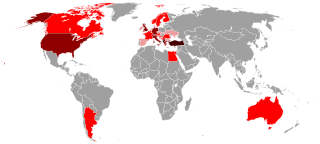Related Research Articles

The Albanians are an ethnic group native to the Balkan Peninsula who share a common Albanian ancestry, culture, history and language. They are the main ethnic group of Albania and Kosovo, and they also live in the neighboring countries of North Macedonia, Montenegro, Greece, and Serbia, as well as in Italy, Croatia, Bulgaria, and Turkey. Albanians also constitute a large diaspora with several communities established across Europe and the other continents.
Surname conventions and laws vary around the world. This article gives an overview of surnames around the world.

Serbian culture is a term that encompasses the artistic, culinary, literary, musical, political and social elements that are representative of Serbs and Serbia.

Fra Luka Ibrišimović, O.F.M. was a Croatian friar, cultural worker, soldier and a spy. He was best known for leading an uprising against Ottoman forces in Slavonia during the Great Turkish War.
Albanisation is the spread of Albanian culture, people, and language, either by integration or assimilation. Diverse peoples were affected by Albanisation including peoples with different ethnic origins, such as Turks, Serbs, Croats, Circassians, Bosniaks, Greeks, Aromanians, Ashkali and Balkan Egyptians, Romani, Gorani, and Macedonians from all the regions of the Balkans.
Kaplan is a surname that is of ultimately Latin origins. There is also a historically unrelated surname in Turkey.
This article features the naming culture of personal names of ethnic Serbs and the Serbian language. Serbian names are rendered in the "Western name order" with the surname placed after the given name. "Eastern name order" may be used when multiple names appear in a sorted list, particularly in official notes and legal documents when the last name is capitalized.

The Albanian Declaration of Independence was the declaration of independence of Albania from the Ottoman Empire. Independent Albania was proclaimed in Vlorë on 28 November 1912. Six days later the Assembly of Vlorë formed the first Government of Albania which was led by Ismail Qenali and the Council of Elders (Pleqnia).

The Bosniaks are a South Slavic ethnic group native to the Southeast European historical region of Bosnia, which is today part of Bosnia and Herzegovina, who share a common Bosnian ancestry, culture, history and language. Predominantly adhering to Sunni Islam, they primarily live in Bosnia, Serbia, Montenegro, Croatia, Kosovo as well as in Austria, Germany, Turkey and Sweden. They also constitute a significant diaspora with several communities across Europe, the Americas and Oceania.
Mandić is a Serbo-Croatian surname, a matronymic of the feminine given name Manda, a hypocorism of Mandalena, a variant of Magdalena imported from Italian.

The Bua were a medieval Albanian tribe. The name is first attested in 14th-century historical documents as one of the Albanian tribes living in the Despotate of Epirus. Later on, the Bua settled southwards in the Peloponnese, and a part of them found refuge in Italy in the Arbëreshë migrations that followed the Ottoman conquest of the Balkans. A branch of the tribe regiments was ennobled in the Holy Roman Empire after its service in the Stratioti, a Balkan mercenary unit. Mërkur Bua, its most prominent member, was Count of Aquino and Roccasecca.
Filipović is a patronymic formed out of the name Filip and the suffix -ić. It is a common surname in South Slavic languages. It's cognate to Bulgarian Filipov or Polish Filipowicz.

The Hebraization of surnames is the act of amending one's Jewish surname so that it originates from the Hebrew language, which was natively spoken by Jews and Samaritans until it died out of everyday use by around 200 CE. For many diaspora Jews, immigrating to the Land of Israel and taking up a Hebrew surname has long been conceptualized as a way to erase remnants of their diaspora experience, particularly since the inception of Zionism in the 19th century. This notion, which was part of what drove the Zionist revival of the Hebrew language, was further consolidated after the founding of the State of Israel in 1948.
Poland is an Irish surname that has been Anglicised from MacPoìlin. Outside of Ireland, it can be of English and German origin.
Marko Mesić may refer to:

Burmazi was an Albanian tribe which is attested in Herzegovina in the Middle Ages.
Kvesić or Kvesic/Kvesich is a Croatian and Herzegovinian surname. It is believed the surname is derived from the Turkish term kavas for a kavass by adding the Serbo-Croatian surname forming suffix -ić. Notable people with the surname include:

The Meksi were a noble Albanian family. Members of this family are found in Albania, Italy and Greece, whose members distinguished themselves in shipping and politics.
References
- 1 2 3 "Mesic Surname Origins". Forebears.io. Retrieved 6 April 2023.
- 1 2 "Mesic Name Meaning". ancestry.com. Retrieved 6 April 2023.
- ↑ Hanks, Patrick; Lenarčič, Simon; McClure, Peter (1 November 2022). Dictionary of American Names (2nd ed.). Oxford University Press.
- ↑ Meksi, Fedhon (2010). Labova dhe Madhe dhe Labovitët: Gjurmime në vite. Migjeni. ISBN 978-99956-718-9-1.
- ↑ "Croatian Surnames in the United States of America". croatian-genealogy.com. 21 August 2009. Retrieved 6 April 2023.